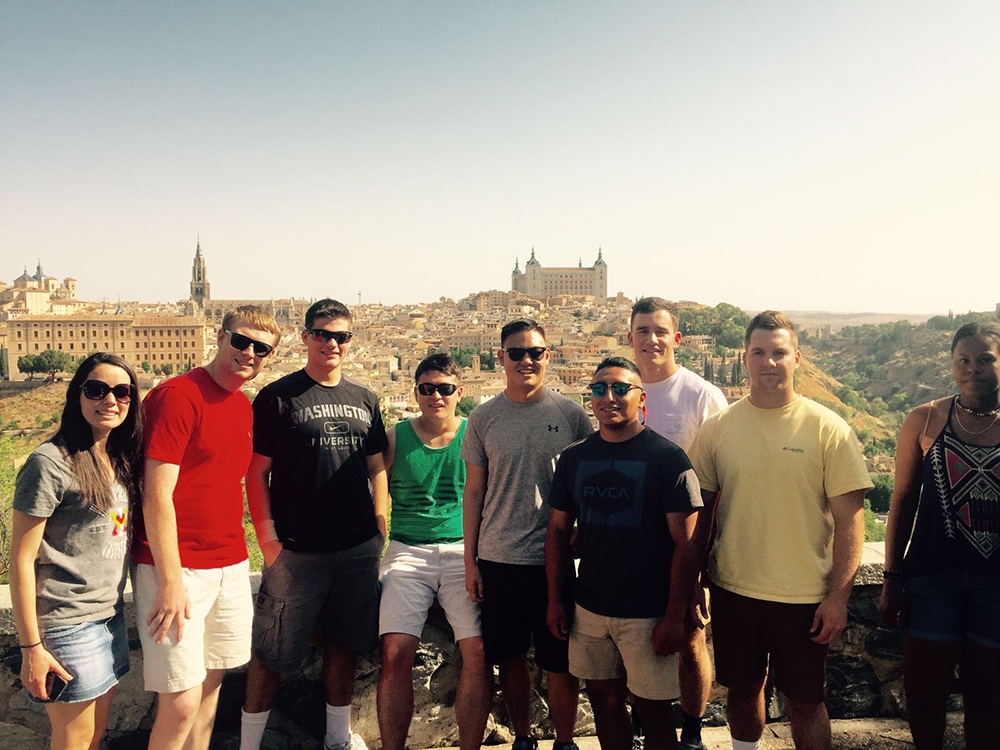Cadets Explore History of Spain
 |
|
The cadets pause for a photo during their excursion to Toledo. – Photo courtesy of Dr. Sabrina Laroussi. |
LEXINGTON, Va., Aug. 24, 2016 -- Fourteen cadets experienced both a new culture and a new class this summer when they traveled to Madrid, Spain, to study Spanish language and culture.
Leading the five-week trip to Alcalá de Henares, a college town located about 35 kilometers from Madrid, was Dr. Sabrina Laroussi, assistant professor of modern languages and cultures. Studying at the Universidad de Alcalá, cadets took both a Spanish language class and a new class, Survey of Spanish Culture and Society, the latter taught by Laroussi, and in the process earned a total of nine academic credits over the course of the program.
Outside of class, the cadets spent their afternoons visiting museums and their weekends visiting some of Spain’s historic cities, among them Seville, Cordoba, Granada, and Barcelona. These excursions were a focus of the new class, which Laroussi described as “a culture class designed to educate students on Spanish history.” The cadets completed a questionnaire assignment at each site they visited.
But perhaps the heart of the learning took place not in classrooms or at historic sites, but in private homes. Each cadet was paired with a non-English speaking host family as part of an effort to increase language fluency through immersion.
It was a strategy that worked. In an email interview, Luke MacDonald ’17 wrote, “My host family’s not being able to speak English was a blessing in disguise because even though communicating was difficult at first, being forced to communicate and understand Spanish while talking to them greatly benefited my language skills.”
The host family experience enhanced the cultural learning as well for Anthony McAtee ’16. “I’m glad I was able to have a host mom to make traditional dishes,” he wrote. “During and after every meal we would discuss various and diverse topics, which helped my speaking tremendously.”
“Going home to my host mom after classes was great,” wrote Gloria Welch ’17. “She would have food ready and we [would] watch the news. … She always explained what was going on so that I could understand.”
Welch said she ran into a few hiccups as she adjusted to studying Spanish in Spain, as the language there is slightly different from the Spanish spoken in the Americas. McAtee, though, said that he’d found learning the language-learning process less challenging than he thought it would be.
“Studying Spanish in Spain was a lot easier than I thought – the environment forces a necessity to learn and being surrounded by mostly people who don’t speak English actually makes it easier in a sense,” he wrote.
Laroussi, meanwhile, had the quiet satisfaction of watching her students’ language skills take off. “It was … very rewarding seeing students, after the first few days, speak only in Spanish between them, with me or when ordering something in a restaurant,” she commented, “although it was in funny, simple, and easy conversations that [they] proved how integrated they were in the culture and willing to learn the language.”
Laroussi’s students were among the 119 cadets who undertook a study-abroad program this summer, according to Patricia Hardin, assistant director of international programs. Overall, there were 10 study-abroad programs led by VMI faculty members this summer.
– Mary Price
-VMI-
.svg)
.png)